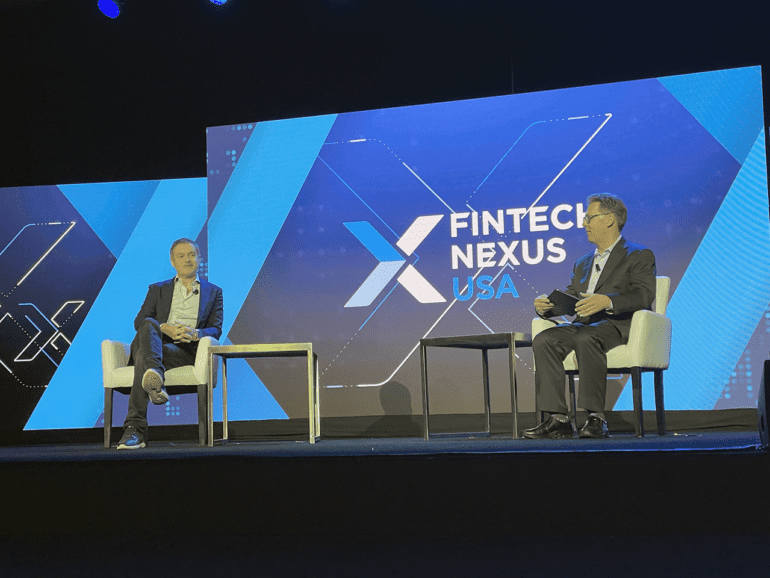NEW YORK, N.Y. — Superhumans have shown up to the AI discussion — minus capes but with added insight and intelligence.
The ability to bolster human knowledge in a short amount of time is a tantalizing prospect for the application of AI.
“This is a good way to think about what … the potential return on investment could be,” Marco Argenti said of what artificial intelligence — the hottest term in fintech and, frankly, the digital landscape in general — has the potential to alter for corporations while delivering the opening keynote speech on Wednesday at Fintech Nexus USA 2023.
“It might sound theoretical, but then you can think about the following: What would boost the productivity of X percent in a particular person regarding his knowledge.”

At the heart of the impact of AI on financial services, never mind other significant aspects of human society, is the ‘revolution of knowledge,” the chief information officer of global investment giant Goldman Sachs said.
“There are two ways to think about AI today, and they’re not mutually exclusive. You can think of it as a sustaining technology that makes your business more productive. You can think of it as a disruptive technology, especially in the area of knowledge, and that will make your business more competitive,” said Argenti, who held leadership positions at several major technology companies, including Amazon Web Services, Nokia, and Microforum Inc. before joining Goldman Sachs, during a one-on-one conversation with Fintech Nexus chairman Peter Renton on the keynote stage at the Javits Convention Center.
“Productivity is great, but it’s not enough. I always say you can get fit as a human body, but that doesn’t necessarily make you a champion. It’s a necessary but not a sufficient condition. You can be very efficient and still not win in the market. I think it’s the revolution of knowledge, what AI brings, that I think is transformative.”
AI’s impact on historical par with printing press
Many a hyperbolic metaphor can be attached to all that AI has the potential to bring to the world — whether that’s the discovery of fire, the development of the wheel, or the creation of the light bulb — but Argenti picks the printing press as AI’s closest innovative cousin because of its impact on human understanding and awareness.
“The printing press created the conditions for scalability of knowledge. It removed the barrier of physical access to knowledge,” Argenti said.
“Before (for example), if you wanted to know math, maybe you needed to know a mathematician and have access to his manuscripts or hear his words. The printing press eliminated the constraints of physical access to knowledge, creating libraries, universities, schools, and education as we know it today.”
Productivity is great, but it’s not enough. I always say you can get fit as a human body, but that doesn’t necessarily make you a champion. It’s a necessary but not a sufficient condition. You can be very efficient and still not win in the market. I think it’s the revolution of knowledge, what AI brings, that I think is transformative.”
— Marco Argenti
Still, a “very important barrier” exists for AI in its potential to become a landmark shift comparable to Gutenberg’s 15th-century invention: “the accessibility of content from an understanding standpoint.”
In other words, AI has the potential to make complex information and concepts understandable to a much more significant percentage of the population.
“If you have a very complex book that is written for a mathematician but maybe still contains about two concepts that you, as a business person, for example, want to access, you will have to read and ask someone to translate it for you in simpler terms, or different terms, or you have to study a lot, so there is a barrier there,” Argenti said.
“We see with ChatGPT and AI that it’s almost like a book that explains itself based on how you interact with the book itself for the first time, the reader and the writer at the same level.”
Potency of AI revolution hinges on ability to make bold decisions, experimentation
AI’s potential impact on society is fascinating, but for Argenti, one of its most enchanting prospects comes in the corporate arena.
“I’ve seen the Internet revolution, I’ve seen the app revolution, I’ve seen the cloud revolution, the mobile revolution,” Argenti said. “In all cases, the two kinds of factors that are so important for anybody to make decisions are A) enabling people to experiment, because you really cannot plan what the success will be. There’s just too much available right now.
“But the second one is also to make bold decisions. You need to have some form of intuition to say, ‘OK, I cannot do everything, but I will choose this,’ and maybe something else, and then you focus on those. That kind of intuition also comes from experimentation.
“There’s a moment where every company, CEO, and CIO needs to go through that mental model. This idea of who to superhumanize to get the highest yield is a question that will be interesting for everybody to reflect on.”


